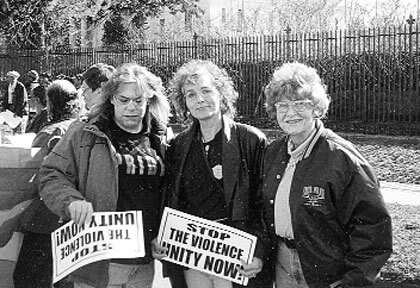Group alleges Human Rights Campaign ignores needs of transgendered people
The Gender Rights Advocacy Association of New Jersey (GRAANJ), a statewide organization that promotes the rights of transgender and inter-sex people, announced this week that it intends to return the unspent portion of a $3,500 Equality Grant given it by the Human Rights Campaign (HRC), a Washington-based lobbying group for the lesbian, gay, bisexual, and transgender (LGBT) community.
GRAANJ said it was acting to protest HRC’s “continuing ambivalent position on transgender inclusion in federal civil rights and hate crimes legislation.”
“They [HRC] are telling everyone that they represent the entire GLBTI community, but they’re giving mixed messages,” said Barbara Casbar, GRAANJ’s political coordinator.
The New Jersey group was given the grant to support efforts to persuade the New Jersey Legislature to write explicit protection for transgendered people into the state’s anti-discrimination law.
“I think we’ve been clear in our support for transgender inclusion and equality,” said Michael Crawford, an associate field director at HRC who oversees state and advocacy programs. He said this is the first time a recipient has returned funds granted by HRC and that his group first starting working with GRAANJ last year.
Crawford argued that HRC demonstrated its commitment to transgender inclusion in its lobbying on behalf of the Connecticut hate crimes legislation and the gender rights law passed in New York City in 2002.
“It’s a tougher road to hoe at the federal level,” Crawford said, “because we have been unable to convince lead sponsors on [the Employment Non-Discrimination Act] to include gender identity.”
Casbar acknowledged the assistance HRC funds offered GRAANJ in working on legislation in New Jersey, but said HRC representatives were demonstrably negligent in providing other needed support, particularly in the form of human resources.
“We were supposed to get help and didn’t,” she said, citing an April 17 town meeting at Rutgers University at which an HRC representative was scheduled to appear as a speaker, but never showed up.
Casbar said this demonstrated a general lack of support from HRC for transgender concerns.
“Contact any transgender organization in the country,” Casbar said. “I think they’ll be even stronger than I am in their criticism of the HRC. It’s obvious.”
The GRAANJ action occurs at a time when some transgender activists have made vocal attacks on HRC. Most of these objections center on what some view as HRC not being forceful enough in getting transgender-inclusive language into the Employment Non-Discrimination Act (ENDA), a federal proposal, and the Local Law Enforcement Act (LLEA), a hate crimes bill. ENDA, is designed to provide a comprehensive federal prohibition of employment discrimination on the basis of sexual orientation. LLEA passed the Senate this week without the language gender rights advocates sought.
In the May 21 issue of the Washington Blade, columnist Gwen Smith, a San Francisco-based transgender activist, accused HRC of not only being passive on trans-inclusive language in federal legislation, but also actively subverting attempts by other organizations to get such wording included.
According to Casbar, “We were reluctant to do this, but I felt it was necessary to expose what a lot of people don’t realize. They [HRC] were actively pushing the non-inclusive version of ENDA. They gave up on us.”
But some in the transgendered community disagree with GRAANJ’s criticism of HRC.
“My understanding is that they [GRAANJ] got this equality grant to do the work they’re doing on a local and state level, not the federal level, so I’m a little surprised that they’d raise this issue,” said Pauline Park of the New York Association for Gender Rights Advocacy. “HRC is not where some transgendered activists want them to be, but they’ve come a long way and that needs to be recognized.”
HRC political director Winnie Stachelberg, in response to allegations questioning the organization’s commitment to transgender-inclusive language in ENDA, issued a statement on June 7 noting that the group sent a letter to the bill’s lead sponsors, Sen. Ted Kennedy and gay Rep. Barney Frank, both Massachusetts Democrats, saying that HRC will “unequivocally support the inclusion of gender identity as a protected category in [ENDA].”
“Unfortunately, ENDA was re-introduced without such inclusion,” Stachelberg wrote. “But we’re not giving up. We’re not satisfied with the current language, and we will not waver in our efforts to persuade members of Congress to make the legislation inclusive.”
Casbar said that enough organizations are supportive of GRAANJ that the disagreement with HRC will not impact negatively on the transgender rights movement.
“We’ve already had calls from people in the community offering to make up what we gave back,” said Casbar.

































